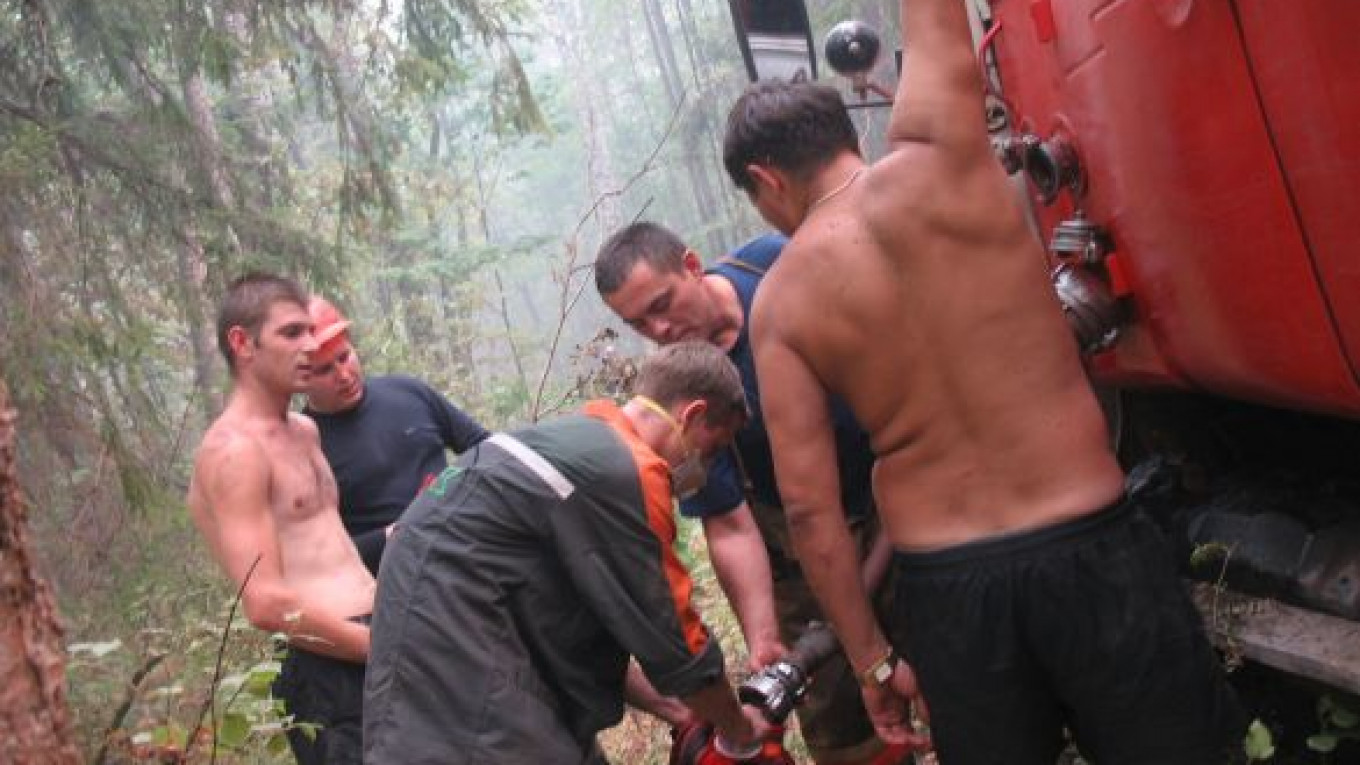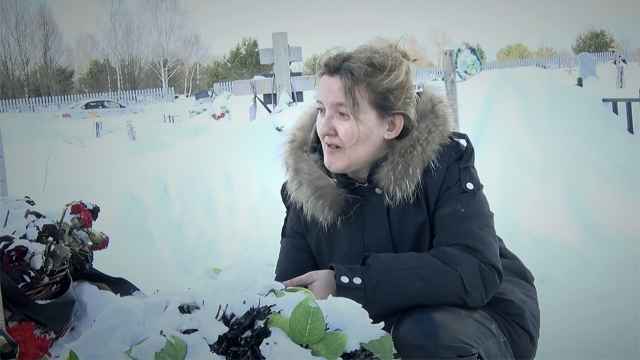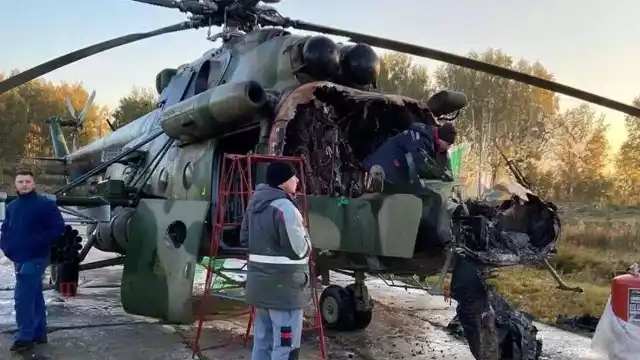VERKHNYAYA VEREYA, Nizhny Novgorod Region — Forty minutes. Just five minutes less than halftime in a football match and about the length of a TV show. It was enough time for a village of 341 houses to burn to the ground in the Nizhny Novgorod region.
The village, Verkhnyaya Vereya, is where Prime Minister Vladimir Putin kicked off his tour of areas affected by the rampant wildfires that have forced the government to declare emergencies in seven regions, including the Nizhny Novgorod region.
Verkhnyaya Vereya is one of several villages that dot the peat bog-filled forests in the region's Vyksa district, affectionately nicknamed by locals as Little Switzerland for its fresh air and virgin woods. Located 14 kilometers from the main local town, also called Vyksa, population 60,000, the village has a morbid history that earned it its former name, Giblovka — from the Russian word gibly, or "bringing death." In the old days, locals were said to have disappeared in a nearby swamp.
But locals love the forests and the calm that they usually offer. For the past two years, Konstantin Belov, 64, actively renovated his late parents' house in Verkhnyaya Vereya. A lifetime's worth of savings went into remodeling the house, buying new furniture, installing modern ceilings and digging a small garden in the backyard.
Belov, a school principal in the nearby village of Novodmitriyevka, planned to comfortably retire with his wife in the house, their dream home. They finished work on the house in mid-July and got ready for some rural R&R.
"It made us happy for three weeks," Belov said.
That was until July 29, when the house burned down together with the rest of the village in 40 minutes — and just 15 minutes after Belov frantically loaded a few tools into his gray Volga and sped out of the village as flames and wind quickly approached his house.
A week later, he came back to collect what was left. All that remained was a pile of charred scrap metal sitting on the scorched lawn to the right of what used to be his house.
"Now there's just this," Belov said, pointing at the junk. "We've collected a pile of iron. We can at least scrap it and collect a little something."
On July 30, Putin promised to rebuild the village and even to install gas pipes, something that the locals had wanted for years. They believe him, they say, and hope to move into their rebuilt houses by Nov. 1.
But shocked and reluctant to give up their memories, the villagers insisted during a meeting with regional officials shortly after the fire that their new homes be built on the exact same spots where they once stood, Belov said.
A woman who dared cry out, "There is a bad aura around this place — we should not live here," was shushed and jeered at the meeting, Belov said.
Belov, too, wants to stay, even though a relative, a 75-year-old aunt, burned to death a few houses away. Aunt Nyura refused to leave her house when the other residents fled in their cars.
"Aunt Nyura was still pouring water on burning wood while everything was falling apart and burning around her," Belov said. "They looked for her for a week, hoping that she was still walking around someplace. And the day before yesterday, the police came and they found her remains. The forensic experts collected an envelope with bones yay big" — he extended with his hands to show a catalog envelope.
Today, Vyksa and the neighboring villages are Little Switzerland no more. If you wash yourself after a brief stroll, black tar will ooze out of your every pore. The smog is so thick and impenetrably white, it feels like you are in a milk bottle. The semisweet nauseating aftertaste of fumes and char gets stuck on your teeth. And while some locals wear facemasks, most have long given up on the thin piece of paper that seems to offer no protection or solace.
Smog, they say, is the least of their worries. Many live only meters away from the forest, parts of which have been burning on and off since June. A bad cough seems negligible compared with the possibility of losing a home to wildfires.
Everyone in the Vyksa district has a story to tell: an acquaintance who either lost a home, a barn, a relative, or spent a day digging trenches and sprinkling pine trees and smoldering peat bogs with water.
Fighting Alone
After a few days of smog, Muscovites started to flee the capital last weekend. Those living in Vyksa and the neighboring villages often find themselves with nowhere to go. By late July, with 14 people declared dead in Verkhnyaya Vereya alone, a few villages razed, and a heap of promises from the federal government but no organized support from the local authorities, locals decided to fight on their own.
They picked up spades, shovels and backpack sprayers. They chipped in for gas and used their own tractors and bulldozers to clear out parts of the forest adjacent to their homes to prevent forest fires from spreading.
Belov made his first round of phone calls on June 12, the Russia Day holiday, when he smelled smoke wafting though the forest near his home.
"I called the forest rangers — they were quiet, the administration was quiet — and the emergency services, then an information center," he said. "I was told that it was just smoke coming from the direction of a small village that had burned down and that we weren't in danger and had nothing to worry about."
Belov considers himself lucky. He and his wife had not yet moved most of their belongings from their house in Novodmitriyevka, about 30 kilometers away. Less fortunate residents from the fire-ravaged villages of Verkhnyaya Vereya, Tamboles, Semilovo, Snoved and Borkovka, all within 10 to 15 kilometers from one another, have moved in with relatives and friends. The other third of the 1,200 evacuees have ended up at an evacuation center located in a children's summer camp, Lazurny, about 14 kilometers from Vyksa.
Those in Lazurny are sick of reporters. They hope to have new homes — "as Putin promised," several said — and just want to be left alone, grateful for the free meals and a roof over their heads.
People living in villages untouched by wildfires so far are ready to be uprooted at any minute. Many keep money and documents in small plastic bags by the bedside and a car trunk full of essentials, like water and clothes.
Dazed Evacuees
Villagers in Vilya, just across a small river from Verkhnyaya Vereya, were evacuated twice over the course of a single week. At noon last Wednesday, they prepared to be bused back to their homes from emergency shelters created at Schools No. 4 and 8 in Vyksa.
The villagers appear disoriented and confused, roaming along the long corridors of the smoggy schools like sleepwalkers. Back and forth. Back and forth. When asked about the first evacuation, they say it happened yesterday. But when pressed about how much time they have spent at the school, the same people give various answers: three nights, a day, a week.
"This is our second night here, or maybe the third, I don't remember," said Nadezhda Panteleyeva, 52. It is the second time that she has been evacuated with one of her two little grandchildren. "They came for us at half past 1 in the morning. The baby was crying. We didn't have the time to get any diapers."
Many of the evacuees from Vilya felt dizzy and nauseous. Children were laughing but not running around. Some were lying down, burning with fever and vomiting constantly.
Asked how he felt, Valentin Budyanov, 64, replied: "Not too well. Pretty awful, actually."
Even though the air quality has not improved near their houses, the absence of fires meant that it was time for them to return home.
"I had a little kiddy tub [filled with water] in my backyard," Budyanov recalled, providing a metaphor for how the locals were feeling. "I checked on it in the morning. It was dry and all covered in grime."
Rushed by cranky regional administration workers and school officials, who themselves had been working round the clock since the evacuees were brought in, grandparents and children climbed the steep stairs into the buses.
Yevgenia Sizova, 75, said she was not particularly happy about being evacuated. Most of the 14 people who burned to death in their houses in Verkhnyaya Vereya were pensioners, and Sizova said that, like them, she "has lived long enough."
Sizova recently returned from the city of Asbest — named after its asbestos deposits — in the Urals, where she lived with a daughter for a year. But her distaste for asbestos-linked pollution and a strong desire to die close to her roots brought her back to Vilya, where her other daughter lives.
Her 12-year-old granddaughter, Lyudmila Sherbakova, had insisted that her grandmother be evacuated this time and had walked her out of the house when the police came knocking on her door. The frail little girl with big blue eyes is spending the summer taking care of her grandmother while her parents work shifts at local factories.
Getting the Word Out
The divide between the villagers and those who live in the town of Vyksa is fairly strong. The villagers, whose houses are built next to the forest, are on guard round the clock. The urbanites suffer from smog and heat but seem more relaxed, hoping to always find shelter in their concrete, multistoried apartment buildings.
The village folk stay close together. Shirtless and tanned, they load trucks with water and spades. They guard their houses in shifts and incessantly drive to the forests to dig trenches, hose down peat bogs or patrol the area.
Many also work at the local factory owned by the United Metallurgical Company, or OMK, Russia's sole metals supplier to the Nord Stream gas pipeline. After spending a shift in OMK workshops, they take a shift patrolling the forest to look out for fires. The schedule leaves some with two to three hours of sleep every day.
"Our houses stand right by the forest. If not us, who is going to defend them?" said Alexander, who refused to give his last name for fear that he will "get it in the neck" from the plant administration.
Unlike factory workers who live in the villages, the urbanites slack off, Alexander said. "They have nothing at stake here," he said. "So while we slave away, they sit by the pines and smoke."
But help does come from some Vyksa volunteers, who complain that a lack of information on the local television channel and the poor direction of relief efforts have prevented them from providing more assistance.
The spotty information prompted two Vyksa residents, Yulia and Sergei Panteleyev, to compile information about the fires and ways that locals could help on their web site Wyksa.ru.
Young Internet-savvy volunteers from the Vyksa district quickly flocked to the web site's discussion forum, venting their frustration and fears, and mobilizing their forces to fight the fires.
Their work, however, has irritated the local administration, and at least one local newspaper has referred to Wyksa.ru as "a web site of dubious content."
"There are rumors within our plant that OMK plans to ban us from accessing Wyksa.ru because people vent on the web site too much," Alexander said.
Yulia Panteleyeva expressed doubt that her web site faced any threat of closure. "All the IT guys are on our side, and the administration and management just aren't smart enough to figure out how exactly they can block content or shut down our web site," she said.
On Thursday, however, the web site came under a hacker attack that left it virtually inaccessible over the weekend. It was back up Monday.
With a Firefighting Crew
Web site staff hang out at the large cabin that houses a team of forest rangers from the Rizodeyevskoye forest district. The Vyksa district's forests are divided into six parts, including the Rizodeyevskoye district, and each is overseen by a team of forest rangers.
The cabin is also a pit stop for volunteers and two brigades of four firefighters each from Ufa, Bashkortostan. They try to work in pairs but still find themselves surviving on about two hours of sleep every night.
One of the firefighters, nicknamed Salo, Russian for "lard," has bluish green eyes and a voice hoarse from the smoke and what seems to be a cold. He chain-smokes and tends to a firetruck in a pair of shorts. Dirty and exhausted after 2 1/2 days of driving to the fires and then trying to put them out, he does not complain.
“I pass out at around 2 a.m., but by 5, I am already restless,” he said.
He and his partner, Rush, stick together. Rush, square-shouldered, strong and agile, hops on top of the firetruck and then off the next minute as he carries a fire hose right up to a burning peat bog.
They do not show their exhaustion, but clear signs give it away: A firefighter from their brigade took a two-hour nap in an abandoned house and woke up to find his shoes missing. He was not sure whether he had fallen asleep with his shoes off or whether they had been stolen. But after hunting for them, he gave up and went to work barefoot.
Many firefighters point to the lack of organization in rescue and relief efforts by local authorities. But the Rizodeyevskoye forest district, they say, is a good example of where forest rangers rightly took matters into their own hands.
“With the forest rangers here, there is some kind of organization," Rush said. "[The warden] directs people; they have something to do. There was some misunderstanding initially, but everything works like clockwork now. I really like what the forest rangers are doing."
The warden for the Rizodeyevskoye forest district, Alexander Rovnov, and his aide Marina Klimova have been working with no days off for the past seven weeks but are required to punch in for regular eight-hour shifts. Neither would say who was requiring them to report working only eight-hour days, but they said they were not getting paid extra.
Despite the long hours, they have received complaints from the local administration for working on their own initiative and for accepting help from a self-appointed aide, Sergei Skorodelov, a former local who moved to Moscow but returned this summer to make sure that his mother, who lives in a local village, was safe.
Skorodelov said he drove to the forest district's cabin “to check on the situation” but ended up staying to “work the phones."
“I am not afraid of anybody,” said Rovnov, an Afghan War veteran who has worked in the forests for 27 years. He talks tough but looks grim. If he continues to work with Skorodelov, he might lose his job.
Skorodelov, a spare parts engineer with the Aviatekhkom aviation company, said he has declared war against the local authorities. “I am here because you aren’t doing your job," he said of the authorities. "I’d be happy to go back to Moscow.”
Skorodelov first stirred up ire when he started to write letters to the local administration listing organization problems like a lack of walkie-talkies for forest rangers and a shortage of police patrols in the area.
He has made his personal mission to find walkie-talkies for the rangers and have at least one policeman prevent locals from going to the local beach — a stretch of sand along the one of the local ponds — where a single cigarette butt ignited a fire just meters from the forest and a gas station last Tuesday. Fortunately, he said, the fire was put out with the help of volunteers.
Several attempts to speak with Vyksa district officials were unsuccessful Friday, with a representative saying they were holding an emergency meeting. Calls on Monday evening went unanswered.
'Total Chaos'
The wildfire disaster could and should have been prevented, locals and emergency workers said.
“If Vyksa authorities had struck at once by sending factory workers and equipment, this would not have happened," said Budyanov, the evacuee from Vilya. "Had they just put it out, this would not have happened. And right now [the fire] has started to go in circles. So now it [will continue] until all the forest around the villages burns.”
Sergei Tkachev, a local volunteer, is harsher in his appraisal of the situation, noting that Vyksa suffered a major fire in 1972, and the villagers are used to the peat bogs burning all the time.
“This is an isolated instance of total chaos in our country," Tkachev said.
Now all that is left for the locals is to hope and pray that the wind does not blow the fires into new villages. “Because if it does, nothing will save us,” Budyanov said.
On the surface, everything seems under control. Cameras have been installed to oversee reconstruction work, and local authorities are busy presiding over emergency committees.
Volunteers are distributing humanitarian aid that has come from the Vyksa district, Moscow and Nizhny Novgorod, among other places in the town of Vyksa. Officially, there are two drop-off sites for the care packages. But, Panteleyeva and other volunteers said, businessmen and people from out of Vyksa try to avoid the drop-off spot organized by the ruling United Russia party because they are afraid that the aid won't reach the people who need it.
Calls to the cell phone and office of a United Russia spokeswoman went unanswered Monday evening.
Who's at Fault?
President Dmitry Medvedev dismissed five senior military officials for negligence in connection with the wildfires last week and threatened to take similar measures against anyone else found responsible for the disaster.
But Nizhny Novgorod Governor Valery Shantsev does not appear to face any disciplinary action, despite calls for his ouster. Locals chanted, "Away with Shantsev!" when Shantsev accompanied Putin on his visit to Verkhnyaya Vereya. The chants prompted Putin to talk tough with the regional administration.
But Medvedev has reappointed Shantsev to a second, five-year term, and the governor was sworn in Sunday at a simple inauguration ceremony that lasted about half an hour, Kommersant reported.
"In such a difficult climatic situation, one cannot leave the region without a head," State Duma Deputy Anatoly Kozeradsky told the Nizhny Novgorod news agency last week.
But the head of the Vyksa district administration, Alexei Sokolov, submitted his resignation when Putin visited the area. He returned to his post a few days later.
A Message from The Moscow Times:
Dear readers,
We are facing unprecedented challenges. Russia's Prosecutor General's Office has designated The Moscow Times as an "undesirable" organization, criminalizing our work and putting our staff at risk of prosecution. This follows our earlier unjust labeling as a "foreign agent."
These actions are direct attempts to silence independent journalism in Russia. The authorities claim our work "discredits the decisions of the Russian leadership." We see things differently: we strive to provide accurate, unbiased reporting on Russia.
We, the journalists of The Moscow Times, refuse to be silenced. But to continue our work, we need your help.
Your support, no matter how small, makes a world of difference. If you can, please support us monthly starting from just $2. It's quick to set up, and every contribution makes a significant impact.
By supporting The Moscow Times, you're defending open, independent journalism in the face of repression. Thank you for standing with us.
Remind me later.






